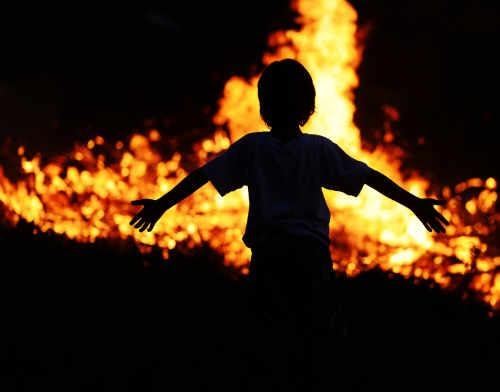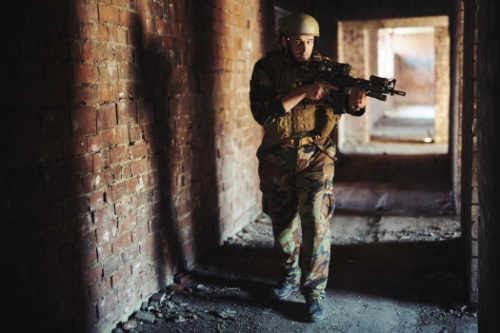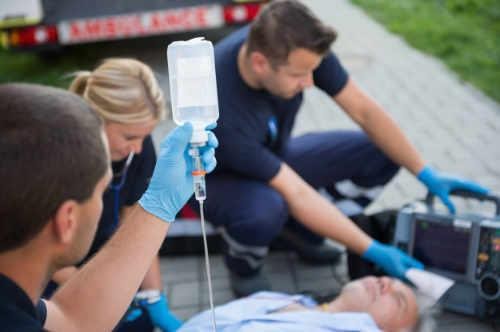First responders on the forefront of crises and disasters are at significantly greater risk of suffering from PTSD
Most Canadians get through an ordinary day without once thinking of the huge sacrifices made by first responders in their ordinary workday. Imagine facing life-and-death situations as a regular occurrence and ask yourself if you could mentally withstand the strain.
Dr. Michael Dadson specializes in treating first responders at his practise at Gentle Currents Therapy and Neurofeedback in Langley, British Columbia. Michael Dadson, Ph.D., has been a Registered Clinical Counsellor since 2000 and has a long history of treating first responders such as police, military, firemen, and veterans.
What, Exactly, is a First Responder?
First responders are increasingly the focus of media and psychological studies today, as they are at the forefront of all crises and disasters which face our societies.
The term “first responder,” according to Wikipedia, means:
“a person with specialized training who is among the first to arrive and provide assistance at the scene of an emergency, such as an accident, natural disaster, or terrorism. First responders typically include law enforcement officers, healthcare workers and other trained members of organizations connected with this type of work. In some areas, emergency department personnel are also required to respond to disasters and critical situations, designating them first responders.”
A non-comprehensive list of first responders would comprise:
- law enforcement officers
- firefighters
- emergency medical technicians (EMTs or paramedics)
- emergency-room doctors and nurses
- 911 dispatchers
- military personnel
All workers in the professions above have at least one thing in common: they are significantly more likely to suffer from PTSD than the population at large.

What Does Trauma Actually Mean?
“Trauma” is the Greek word for “wound” – a physical wound. In English the word is also used to for mental, emotional, or psychological wounds. Etymology can shed light on modern meaning, especially when words are incorporated verbatim from their Greek, Latin, or Germanic roots, and in the case of “trauma”, it can help us to think of trauma as a wound to the psyche.
Some basic dictionary definitions of “trauma” are as follow:
- “a deeply distressing or disturbing experience.” (Oxford Languages – Powering Google Dictionary)
- “an experience that produces psychological injury or pain.” (Dictionary.com)
- “a disordered psychic or behavioral state resulting from severe mental or emotional stress or physical injury” (Merriam-Webster)
Of course, some people are more equipped to cope with trauma than others, but psychological trauma can cause major damage to a person’s psyche. Especially vulnerable are those who have no emotional outlet to express their various feelings of shock, fear, terror, etc.

According to Dr. Mike Dadson:
“First responders are dealing with some new really horrific things and can find themselves in a very dark place, psychologically. I encourage them to see that state as a temporary state of mind, perhaps even just a reaction to some of the horrible things that they have had to witness or anticipate witnessing.”
What is Post-Traumatic Stress Disorder (PTSD)?
Decades ago, veterans would return home from wars with “shell shock” or “combat fatigue,” and it seems that little emphasis was placed on delving into causes or cures.
PTSD became an official diagnosis in the mental health community in 1980 and the term today is fairly well-recognized. Today, awareness of PTSD is increasing, and we are discovering that trauma is often the cause of various mental health challenges across society, not only in military personnel.
The American Psychiatric Association defines PTSD as:
“a psychiatric disorder that may occur in people who have experienced or witnessed a traumatic event such as a natural disaster, a serious accident, a terrorist act, war/combat, or rape or who have been threatened with death, sexual violence or serious injury.”

The disorder itself is complex and is still being debated and clarified by experts in the field, but many scholars divide the disorder into phases or stages, as symptoms begin, develop, peak, and, with therapy, can subside.
According to psychcentral.com, there are five types of PTSD, each with its own causes and recommended treatments:
- Normal Stress Response: a mentally healthy individual is exposed to a one-time traumatic event; treatment can be basic, such as a series of debriefings.
- Acute Stress Disorder: a reaction to a trauma which results in panic attacks and inability to manage; treatment can include both medication and psychotherapy.
- Uncomplicated PTSD: the most common form of PTSD when no other issue is present and includes reliving the trauma; treated with group therapy, psychotherapy, medication or any combination thereof.
- Co-Morbid PTSD: PTSD in an individual with underlying psychiatric issues such as substance abuse, depression, or anxiety; treatment is best when all issues are treated simultaneously.
- Complex PTSD: diagnosed in individuals who have survived prolonged trauma, such as child sexual abuse and may be accompanied by other serious issues such as borderline/antisocial personality disorder, eating disorders and so on; treatment is intense and conducted by a team of specialists.

Causes and Triggers of PTSD
PTSD is not exclusively suffered by first responders. Many kinds of stressors can be traumatic, especially to children, and can lead to full-blown PTSD, but as a group, first responders are at particular risk, due to the life-and-death scenarios they face in the line of duty.
According to the United Kingdom’s National Health Service:
“Types of events that can lead to PTSD include:
- serious accidents
- physical or sexual assault
- abuse, including childhood or domestic abuse
- exposure to traumatic events at work, including remote exposure
- serious health problems, such as being admitted to intensive care
- childbirth experiences, such as losing a baby
- war and conflict
- torture”

Terror, Horror, Dehumanization, and a Sense of Powerlessness
According to Dr. Michael Dadson:
“There is a dehumanization to trauma. To see a person dehumanized can take away all the hope and meaning for living and it can become a dark world where the impulse is just to “want out”. It’s temporary.… Helping first responders to process the horror, the terror, the dehumanization, the overwhelming sense of powerlessness over the situation that can sometimes be so extreme that people have trouble in the moment, coping.”
PTSD and Masculine Gender Socialization – Double Trauma
Cultural norms in our Canadian society are certainly changing now, but most adults today are the products of traditional gender training which can cause problems for everyone.
For men, traditional gender norms can be responsible for feeling that they are “supposed” to keep their emotions to themselves.

According to Mike Dadson:
“This brings us to the intersection of trauma and masculine gender role stress occurs because masculine norms say that men should be able to be independent, emotionally in charge, not needing to be vulnerable, in a sense, not needing to ask for help.
When we experience overwhelming powerlessness, terror, horror, and trauma, for men, it represents a double trauma in a sense because it violates those masculine ideals. “
There are some significant gender differences specific to the issue of PTSD. Whereas women are approximately one third less likely to experience trauma, they are approximately twice as likely to suffer with PTSD as a result.
Dr. Dadson explains that men, due to gender role training, have a tendency to be highly reticent, unaccustomed to exposing their feelings, especially feelings of weakness or fear:
“Suddenly, a man is thinking: ‘I’m not all-powerful, I’m not in-charge, I’m experiencing emotions I don’t understand, so it’s like a failure of the expectations of me as a man’.
And then because masculine socialization of men makes it difficult for them to express their emotions (we have feelings but we don’t express them well), a man is thinking: ‘So now I have this experience but I’m not allowed to really to talk about it,’ or ‘it’s not clear to me where I’m allowed to talk about it’.”
Dr. Michael Dadson is committed to his work with first responders, growing emotional when discussing the issues which they face, and pointing out the fact that all too often, first responders suffering from PTSD fail to reach out for competent professional help and go on to commit suicide.
Says Dadson:
“It’s such a tragedy to me and it never needs to happen, but it just keeps on happening.”
Gentle Currents Counselling and Neurofeedback is currently open for in-person clinical counselling and Neurotherapy treatments. Secure online counselling sessions are also available by appointment in case you prefer to stay at home.
Dr. Michael Dadson, PHD
Jeanette Dadson, Neurofeedback Therapist
Gentle Currents
Counselling and Neurofeedback
Belmont Centre
#109 20103 40th Avenue
Langley BC, V3A 2W3
Call/Text: (778) 554-0174
info@gentlecurrentstherapy.com


